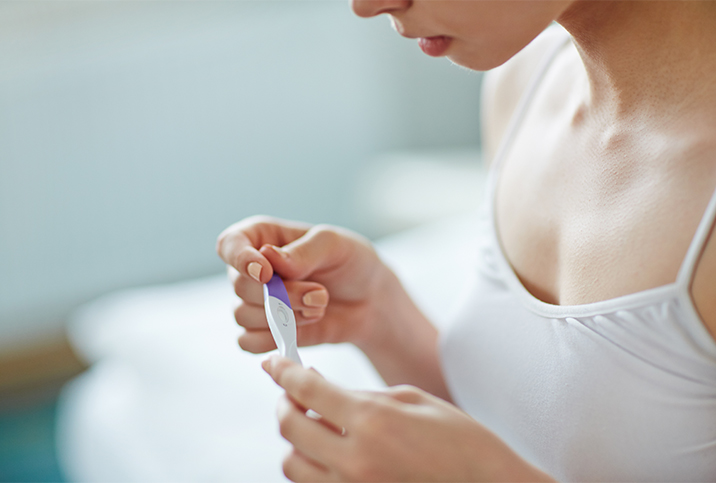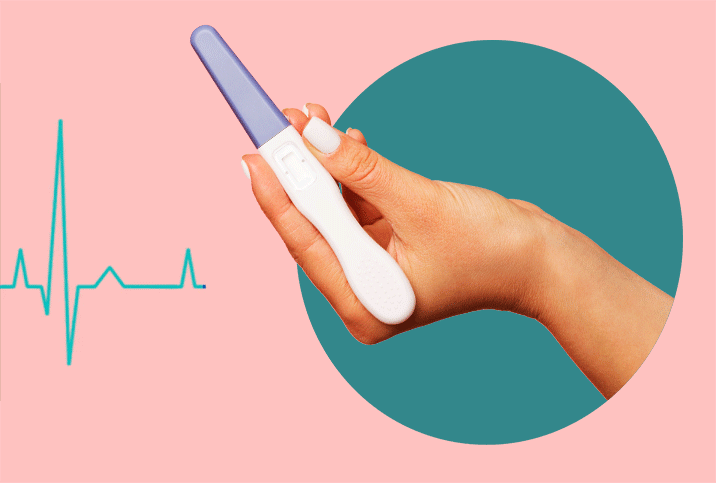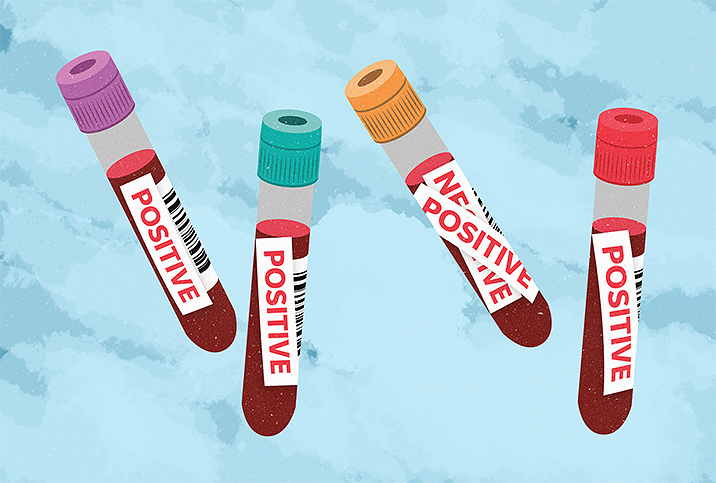What Are the Causes of a False-Positive Pregnancy Test?

Home pregnancy tests today are very effective. Many of them are more than 99 percent accurate, but none is completely reliable because they all depend on factors such as user manipulation.
A false negative is more likely if you take the test prematurely. However, certain exceptions can cause the test to return a false-positive result on extremely rare occasions.
How to take home pregnancy tests
Home tests use a little bit of your urine to detect hCG, or human chorionic gonadotropin.
"Urine pregnancy tests detect a hormone that comes from the placenta called beta hCG," said Christina Miller, D.O., an OB-GYN at Monarch OBGYN in Wooster, Ohio.
The hCG hormone is present in your body only during pregnancy. Any false positive from this test is caused by a medical condition such as problems with the ovaries, an error with the test reading or a recently lost pregnancy.
To get the results, you place a few drops of your urine on the test, dip the test in a urine sample or place the test in your urine stream while you urinate.
These tests include instructions on the wait time to get the results, often about two minutes. The symbols vary but usually have a plus or minus sign, one or two lines, or the words yes/no or pregnant/not pregnant.
Visit your healthcare provider
After you receive a positive home pregnancy test result, schedule an appointment with your healthcare provider. They can do extra tests to confirm the results and check how your pregnancy is going. For example, physicians pay attention to hCG levels. They want to see a steady increase.
"You want to see a doubling of hCG every two days. This indicates a normally growing pregnancy. If the levels aren't doubling, it may indicate a chemical pregnancy, miscarriage or ectopic pregnancy," said Allison K. Rodgers, M.D., who is board-certified in OB-GYN and reproductive endocrinology and infertility, and practices at Fertility Centers of Illinois in the Chicago area.
This means your hCG levels can be useful to determine if there is a problem with the pregnancy. To confirm, your doctor can order other blood tests and a transvaginal ultrasound.
In case the test result was a false positive, your physician can find the cause and guide you along the way. Some of the potential causes they can investigate are a recent pregnancy, certain medications, medical conditions, user error and evaporation lines on the test strip.
A recent pregnancy
Be mindful of the timing of your pregnancy test, because taking one after you've given birth can yield a false positive, Miller said. A miscarriage, recent abortion, stillbirth or recent pregnancy may create a false positive when the test is taken too soon.
"The pregnancy hormone tested in urine pregnancy tests, beta hCG, will remain in your bloodstream for up to four to six weeks after pregnancy, postpartum, miscarriage or abortion," Miller said.
High-sensitivity urine pregnancy tests (HSPT) are an inexpensive and easy at-home option to confirm an abortion ended the pregnancy, but some women may get false positives, according to the authors of a 2021 study published in the journal Contraception.
"The proportion of participants with positive HSPTs declined with time after successful medication abortion. However, nearly one-fifth of participants with complete abortion had positive tests four weeks after treatment," the study authors wrote.
An ectopic pregnancy or a chemical pregnancy—both of these are nonviable pregnancies—can be the cause of a positive pregnancy test, too.
It's urgent that you see your doctor if you have a positive test and experience intense pain in your lower belly. It could be an ectopic pregnancy, a life-threatening condition that occurs when a fertilized egg grows outside the uterus.
Certain medications
Since some infertility medications can cause a false-positive pregnancy test, Miller recommended talking to a doctor about when to take a pregnancy test while undergoing fertility treatments.
"Some of the medications we use for fertility care are actually hCG, the pregnancy hormone. This can cause a urine pregnancy test to be positive," Rodgers said. "I typically recommend waiting at least two weeks after taking your 'trigger' medication to check a pregnancy test."
Most medications unrelated to fertility do not cause a false positive. Some of the drugs that may produce alterations in the tests are anticonvulsants, antihistamines, methadone and diuretics.
Medical conditions
Receiving a false-positive result due to a medical condition is rare, but certain diseases can cause a woman to have elevated hCG levels without being pregnant.
"There are hCG-producing tumors but these are not common," Miller said. "There is also a rare genetic disorder called familial hCG syndrome."
Familial hCG syndrome is a rare, heritable condition that causes an increase in total hCG levels.
Other conditions that can generate a false positive, on very rare occasions, include:
- Kidney infections
- Abnormal cells growing in the uterus
- Some types of cancer, such as kidney, lung, breast, bladder, stomach and liver
- Pituitary gland disorders
- Kidney failure
- Disorders that affect hormone levels
- Rare antibodies
- Certain types of ovarian cancer
- Molar pregnancy
- Phantom hCG
User error
"Operator error is one of the more common causes of false-positive pregnancy tests," Miller said.
Pregnancy tests are very accurate but not infallible. In most cases where there is an error with the test, it is due to incorrect use, such as a misinterpretation of the result.
For this reason, you need to follow the instructions that come with the test. To avoid errors, you can follow some advice from the manufacturers:
- Store the test correctly, as heat or water could affect its effectiveness.
- Check the expiration date of the test.
- Do not use the test too early in your menstrual cycle.
- Use a timer or an alarm to observe the test at the right time.
- In the morning when you wake up, your urine is more concentrated. This is the best time to test.
Misleading evaporation lines
Some tests use two lines to indicate you are pregnant—hCG is detected—and one line to indicate you are not pregnant—no hCG is detected. Failure to follow the pregnancy test instructions can lead to confusion with these lines.
After the recommended time to observe the test has passed, a faint line may appear, which is often mistaken as the second line. This may indicate a recent pregnancy, but in some cases, it is the evaporation line, which can be observed after the urine has evaporated completely. So you don't confuse these lines, carefully observe the lines at the time indicated on the package, not minutes later than recommended.
If you observe a positive result on an at-home pregnancy test, be sure to follow up with your doctor to confirm the result. If for whatever reason you're looking for a new doctor, Giddy Telehealth takes the difficulty out of the search. The easy-to-use online portal provides access to hundreds of healthcare professionals who have expertise across the full scope of medical care. Many of them specialize in women's health and offer same-day video visits, and when you find one you like, setting up in-office visits is simple.


















